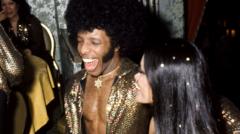Four decades after the original Band Aid, criticisms arise regarding the imagery used in fundraising efforts and how they depict Africa as a place of despair. Prominent figures, including Ed Sheeran and Fuse ODG, express concern over the outdated narratives evoked by "Do They Know It’s Christmas?" inciting a broader discussion about ethical fundraising practices and the representation of African nations in charitable campaigns.
Band Aid's Legacy Under Scrutiny: Reassessing the Impact of Charity Over 40 Years Later

Band Aid's Legacy Under Scrutiny: Reassessing the Impact of Charity Over 40 Years Later
As Band Aid releases a new version of its controversial charity single, voices of dissent question the portrayal of Africa and the effectiveness of its image-driven fundraising campaigns.
The recent release of a fresh mix of Band Aid’s iconic charity single "Do They Know It’s Christmas?" has reignited a passionate debate surrounding its portrayal of Africa and the impact of celebrity-led fundraising efforts. Originally recorded in 1984 as a response to the Ethiopian famine, the song was conceived by Bob Geldof and Midge Ure, who gathered prominent musicians to raise awareness and funds for the crisis.
Ethiopian officials, such as Dawit Giorgis, who was instrumental in disseminating information about the famine, have long criticized the lyrics as a stereotype that mischaracterizes Ethiopia and Africa at large. Giorgis remarked, "Ethiopia was a Christian country before England… we knew Christmas before your ancestors," emphasizing the disconnect between the Western perception of Ethiopia and its reality.
The philanthropic endeavor was undeniably life-saving, and even Giorgis acknowledges the positive humanitarian response. However, concerns about the song's narrative have amplified over the years, with its chorus implying a sense of ignorance among the African population regarding Christmas. Critics argue that such representations are outdated and derogatory, reinforcing colonial stereotypes.
Ed Sheeran, whose voice was featured in the 2014 remake created to combat the Ebola crisis, has publicly voiced regret over contributing to a narrative depicting Africa purely as a place of suffering, stating, "The world has changed but Band Aid hasn’t." Similarly, Fuse ODG, a British-Ghanaian artist, expressed his discomfort with the continued use of lyrics that portray African nations as places devoid of joy and peace.
The growing awareness of the impact of charity campaigns and how they paint entire continents with broad, negative brushes is steering conversations toward more inclusive and respectful representations. Many advocate for new fundraising initiatives that focus on African voices and stories, pushing back against the traditional top-down charity model that has dominated for decades.
With changes in the landscape of charitable giving, there’s increased pressure to reconsider how funds are raised and how they represent beneficiaries. Experts argue that engaging those directly affected can lead to more effective and respectful outcomes. The emergence of ethical guidelines within charities reflects a much-needed shift, aimed at improving the portrayal of marginalized communities and prioritizing their agency.
As we reflect on Band Aid's legacy, the call is clearer than ever: to embrace a narrative where Africans are not merely subjects of charity, but rather co-authors of their own stories, deserving agency and dignity in the global philanthropic landscape. The need for a new, harmonious tune that uplifts rather than diminishes is imperative for the future of fundraising and the portrayal of Africa's multifaceted identity.




















